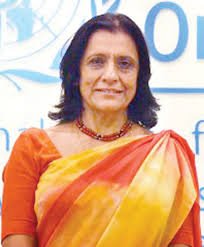World's first 'Birth Defects Day' observed
March 03, 2015 | Tuesday | News | By BioSpectrum Bureau
World's first 'Birth Defects Day' observed
Dr Poonam Khetrapal Singh, regional director, WHO South-East Asia (Photo Courtesy: www.observerbd.com)
The first World Birth Defects Day is being observed on 3 March, 2015, to put the spotlight on this under-recognised problem.
The World Birth Defects Day is an initiative of 12 global health organizations to raise awareness about the occurrence of birth defects, develop and implement primary prevention programs, and expand referral and care services for all persons with birth defects.
In many countries, birth defects are one of the leading causes of death in infants and young children. Infants who survive and live with these conditions are at an increased risk for long-term disabilities.
Birth defects are common, costly and critical health challenges globally and particularly in the South-East Asia Region which reported 49 000 new-born deaths due to birth defects in 2013.
"But a large number of these deaths can be prevented with cost effective measures through the existing health care systems. On this occasion WHO urges countries to take measures to prevent as well as minimise the sufferings of children born with birth defects, with timely and appropriate care," said Dr Poonam Khetrapal Singh, regional director, WHO South-East Asia regional office
The most common birth defects are heart defects, neural tube defects and Down's syndrome, with 94% of the severe ones occurring in middle and low resource settings.
Infants who survive with birth defects suffer long-term disability which impairs them, their families and societies due to the social and economic consequences.
Dr Singh further added, "The problem can only be addressed with a multidisciplinary, multisectoral and multiple programme approach with services involving health, nutrition, food industry, social welfare sectors and civil society, as multiple factors cause birth defects."
Socio-economic conditions where mothers are susceptible to malnutrition, iodine deficiency, folic acid insufficiency; other health conditions such as obesity and diabetes; infections like rubella; and environmental factors like exposure to pesticides, medications, alcohol, tobacco, are leading causes of birth defects.
Advanced maternal age causes Down's syndrome in babies while cultural practices such as marriages among first cousins increases the risk of serious birth defects.
"We also need to build awareness among the people, the programme managers and health workers to seek and provide early care for their children born with birth defects. Timely and appropriate care can cure or minimise the effects of birth defects in children," Dr Singh emphasized.
Addressing birth defects is a key intervention to provide every child best health possible and potential for a full and productive life.
"It is also key to reducing infant mortality rate and achieving the Millennium Development Goal 4, to which all countries are committed," she ended.









